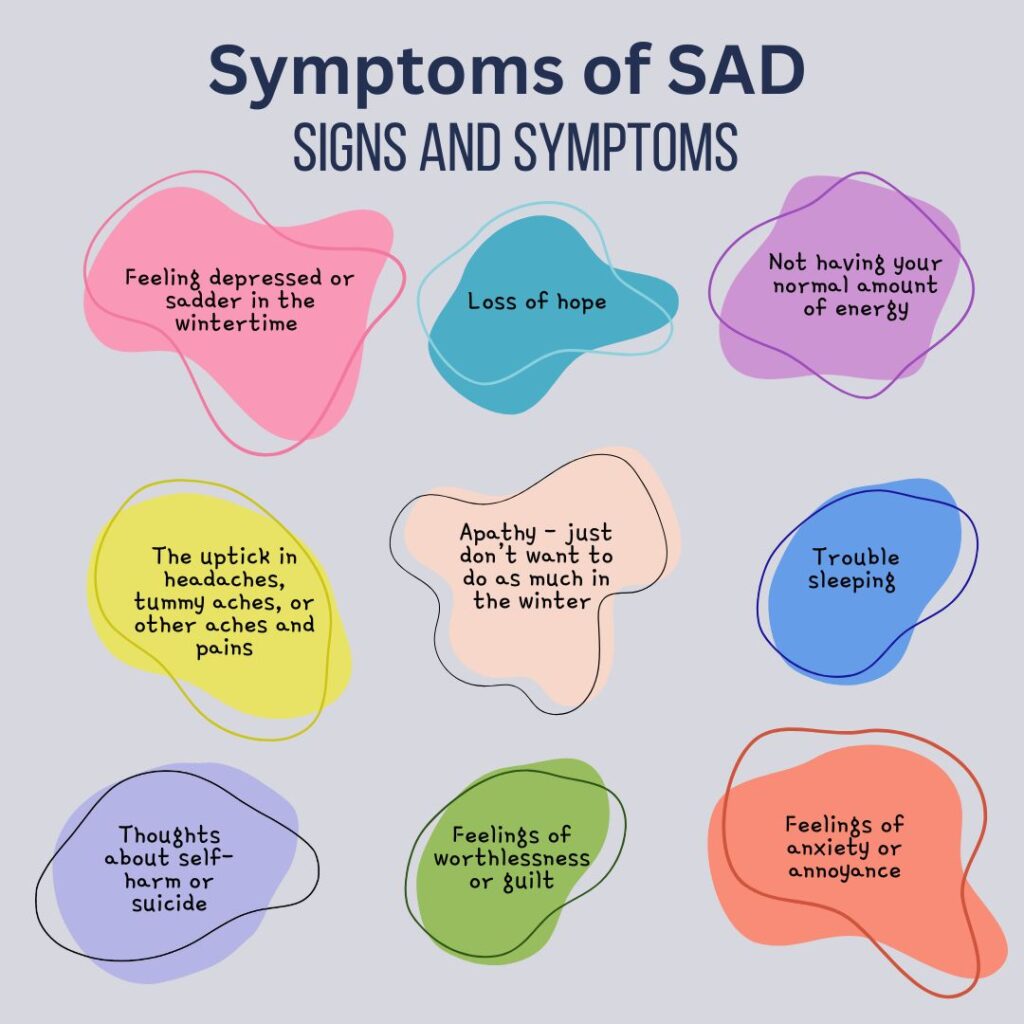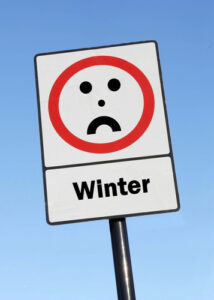What's On This Page?
ToggleIn certain parts of the world, the cold winter season causes a mood disorder called Seasonal Affective Disorder or SAD and it happens at the same time of year. It’s dubbed the winter blues sometimes. There is no discernable cause for the seasonal melancholy either, for example, it isn’t grief or something that you can put your finger on easily. It just comes on out of nowhere.
This is an interesting fact, and few people know it, but there is also a rare form of seasonal depression that occurs during the summer and ends in the fall! But for sure, SAD is the most common condition and it literally makes a person sad!
Statistics about Seasonal Affective Disorder
The winter blues impact over 10 million people just in the USA alone.
80 percent of those with seasonal affective disorder (SAD) are women.
The full-blown condition of SAD (complete with all the symptoms) can begin in people as young as 20 years old, however, symptoms might start in the teen years.
The further you are from the equator, the higher the risk for seasonal depression according to this MAYO article.

Symptoms of SAD – Here’s What it Feels Like
Not everyone experiences the problem the same way. For that matter, one person could have a set of symptoms one day, and it will differ the next day! Here are some of the signs and symptoms of seasonal affective disorder and keep in mind that these should recur for at least 2 years in a row. If it has happened to you just once, you do not have SAD.
Feeling depressed or sadder in the wintertime
Not having your normal amount of energy
Apathy – just don’t want to do as much in the winter
The uptick in headaches, tummy aches, or other aches and pains
Trouble sleeping
Feelings of anxiety or annoyance
Sensations of feeling worthless or guilty
Loss of hope
Thoughts about self-harm or suicide
Risk Factors for Seasonal Affective Disorder
There have been thousands of studies to determine the risk factors and causes of this problem. Research shows several different potential causes and no one is sure if there is just one cause, or if it is a combination of factors. Probably the latter. Here’s a consolidated look at what the clinical studies show:
- There is a strong correlation between reduced sunlight hours and circadian rhythm alterations.
- Serotonin and its downline metabolite melatonin are both reduced and these are major players in mood regulation.
- Hypothalamic changes in the brain during wintertime send a chemical message to the pineal gland in some people, and this message causes higher levels of melatonin. You might think that’s good and induces more restful sleep. That part could be true, however, melatonin in excess will cause low energy and apathy.
- Having someone in your family with SAD or any type of depression seems to increase the risk in other family members.
- If you yourself have depression or bipolar disorder, the risk of seasonal affective disorder will be higher.
- The prevalence of SAD is higher in regions where people live farther away from the equator.
- Reduced vitamin D levels due to poor diet, liver or kidney dysfunction, or poor calcitriol activation correlate with SAD. In other words, problems with vitamin D and D deficiency increase one’s risk.
What Helps Seasonal Affective Disorder
- St. John’s wort has been tried for people with SAD, however, the results are inconsistent. We don’t know if the reason for the inconsistency is due to using inferior blends of the herb, if it doesn’t work in severe cases, or if it just doesn’t work at all… we just don’t know why the results aren’t consistent, but for some people, it does help.
- Vitamin B12 is something that has also been tried. This is self-manufactured in your gut if you have a healthy gut microflora. Levels of B12 can be evaluated by taking a bloodstream. Natural production of B12 can be ramped up through probiotic supplementation and a healthy diet. Or supplementation of B12 directly can be accomplished as well. Similarly to St. John’s wort, results are inconsistent, and we don’t know exactly why.
- Ginkgo biloba has been tried, it increases blood flow to the brain. Studies on ginkgo’s use in the treatment of seasonal affective disorder are lacking.
- Doctors often prescribe SSRIs (Selective Serotonin Reuptake Inhibitors) to increase serotonin levels temporarily. Bupropion is another treatment, it is not an SSRI but rather an NDRI which stands for a norepinephrine–dopamine reuptake inhibitor. Prescribed antidepressants do not cure SAD, but they could relieve some of the symptoms and for some individuals who have a good response, it is potentially life-saving. One well-documented side effect is that it hinders libido and causes sexual dysfunction, as well as weight gain. That’s the trade-off.
- Light therapy devices artificially increase the light that is lacking during the winter time. It requires you to sit near the lightbox (or wear a visor) for about 30 – 60 minutes each morning. I can’t speak for the efficacy of these, and seriously doubt they can resolve the issue. However, there is no harm in trying them, and maybe you’ll be among the lucky ones!
- Progesterone which I will expand upon further down below.
- Vitamin D which I will discuss next…

Vitamin D and Seasonal Affective Disorder
The best-known nutrient for seasonal affective disorder is vitamin D, which is useful for many other conditions including asthma, heart disease, bone health, and migraines. Vitamin D activation doesn’t always go off without a hitch in the human body, and therefore some people could be lacking it more during the winter months.
But it is not helpful for everyone’s case. There are actually two types of vitamin D, which are D2 and D3. Vitamin D3 is the most active and it’s what is found in supplements. It is also known as cholecalciferol and is most similar to what your body manufactures when your skin is exposed to sunlight. Vitamin D can be obtained from the diet, especially in animal-based foods like meat, seafood, eggs, fortified dairy products, and beef liver.
Doses of Vitamin D range from 500 IU to 5000 IU and sometimes even more if your practitioner suggests it. A simple blood test can help determine if you are low in this nutrient.
Hormones and Progesterone May Help with Seasonal Affective Disorder
Some studies point to hormones as one cause of seasonal affective disorder and that’s because more women than men suffer from it according to statistics. So the thinking is that maybe it has something to do with estrogen or progesterone.
We know that by balancing levels of estrogen and progesterone, depressive symptoms may abate, and energy may be restored. An integrative hormone specialist can help you regain hormone balance. Hormone replacement therapy (HRT) may be useful for all mood problems, including SAD.
In particular, progesterone appears to be low in people with SAD. Restoring progesterone with a prescription pill of it at bedtime might be helpful for some people, although just like other treatments, the results are inconsistent.
You can take the first step yourself if you’d like, by ordering an at-home test kit that is a premier hormone test. It’s one of the best, if not THE best hormone evaluation kits you can buy. People think it lacks something a doctor can do because it’s done at home, but it’s quite the opposite.
The DUTCH test is probably the most advanced hormone test, offering an extensive profile of sex and adrenal hormones and melatonin, including hormone metabolites, to identify symptoms of hormonal imbalances allowing you the time and knowledge to intervene years in advance, if you happen to have the propensity to form some harmful metabolite. Oftentimes, supplements such as magnesium, glutathione, vitamin C, herbal remedies, and HRT can shift a pathway. Only the most progressive doctors and hormone specialists can ‘read’ this test.

More about DUTCH: You just urinate on a small filter paper, let it dry, and mail your results to the lab. Then in a few weeks, you get a glimpse of your hormone levels, including the metabolites of progesterone which reveal if levels are low or not. It’s hard to measure progesterone directly, so the metabolites provide a good reflection. The DUTCH Complete Test Kit is available HERE because I am a registered Provider for the company that makes DUTCH (just like many doctors around the US), so the company allows me to sell directly to people without you having to visit me or a clinic. Read this article, The DUTCH Complete Test – #1 Guide to Hormone Testing.
Cortisol
There is a STUDY that compared the daily pattern of saliva cortisol levels across two seasons, summer and winter. There were 52 people in the study so it was small. As you might guess, the cortisol response upon waking up was flattened in those people with seasonal affective disorder compared to the people who did not have SAD. While these results are too small to extrapolate to the population of people who suffer from SAD from a global perspective, I do think it highlights the understanding that there are various different contributing factors to SAD and that physicians who treat it should be evaluating you for more than Vitamin D levels or B12 levels.
It’s important to get a complete workup with this condition because even though it is temporary, and the mood lifts in the spring and summer, it is still very serious for some people, and has in fact led many people to harm themselves. It is a “family” problem, not an individual problem. If you have a young adult in your home suffering from this, or your spouse suffers from it, for example, it impacts the whole family.
I rarely recommend therapists but I think that people with SAD could very well benefit from some therapy. Just be sure to find a licensed qualified, skilled/talented therapist with lots of experience in depressive disorders and specifically SAD. You don’t want someone who listens to you for 5 minutes and hands you a prescription. That will probably not work and may backfire simply because neurotransmitters are a tricky thing. If you push serotonin up, then levels of dopamine could go down relatively speaking, and that’s very bad. And vice versa.
Also, as I explained earlier, prescribed antidepressants work for some, but not most. If they do work for you, the question arises, when do you get off them? In the springtime? Getting off antidepressants is not an easy task, it requires weeks to months of tapering. You can’t just stop them, that is dangerous. So again, pills should not be the first modality employed, they should be the last resort. I know, you are probably surprised to hear that coming from a pharmacist, but that’s precisely why I say they should be the last resort. They do not solve the potential problems that include progesterone deficiency, cortisol/cortisone imbalances, B12 and gut issues, vitamin D deficiencies, and/or hypersecretion of melatonin.
Most people who suffer from SAD do not have the means to go on a holiday to Rio de Janeiro or live a few months in another country like Australia where it’s warm and sunny during our winter months! If you are fortunate enough to be able to do that, see below for some destinations below.
 By December, January and February it is bright, sunny, and warm in the following regions of our beautiful planet, so take a vacation if you can!
By December, January and February it is bright, sunny, and warm in the following regions of our beautiful planet, so take a vacation if you can!
Thailand
Jamaica
New Zealand
Australia
Casablanca (the biggest city in Morroco)
Kenya or Cape Town, South Africa
Hawaii
The Maldives
Canary Islands (off the coast of Morroco)
In conclusion…
If you’re getting the sense that seasonal affective disorder is difficult to treat, you’re right. It is. The condition is caused by various reasons, or a combination of reasons; therefore, a one-size-fits-all treatment does not exist.
If you are having major challenges during this time of year, please see a qualified professional for treatment. Speak to family members or friends about your situation so you are not alone. Keep telling yourself that it will pass, because it has, and it will. Most of all, seek out some treatments that could help you.
Many people, in fact, most people do find benefits with some of the solutions I’ve mentioned above. It’s a trial and error experience to find out what combination works best for you, so just stick with it and you’ll eventually hit on the right therapy that works for you. I wish you the best and I’m rooting for you.

Suzy Cohen, has been a licensed pharmacist for over 30 years and believes the best approach to chronic illness is a combination of natural medicine and conventional. She founded her own dietary supplement company specializing in custom-formulas, some of which have patents. With a special focus on functional medicine, thyroid health and drug nutrient depletion, Suzy is the author of several related books including Thyroid Healthy, Drug Muggers, Diabetes Without Drugs, and a nationally syndicated column.



